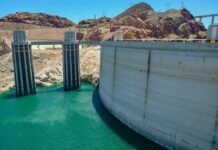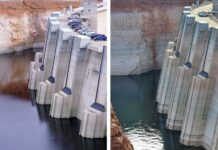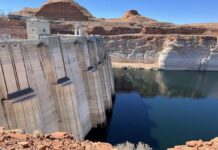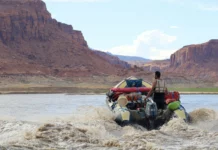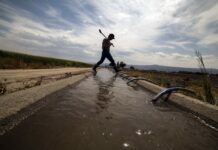Photos: South Lake Powell and Glen Canyon Dam, May 2021
This page features aerial photos of Lake Powell and Glen Canyon Dam near Page, Arizona.
Lake Powell is the second-largest reservoir in the nation by capacity and began to fill...
Photos: Bullfrog Marina and Lake Powell, October 2022
This page features aerial and ground-based photos of Lake Powell's Bullfrog Marina in southern Utah.
Created by Glen Canyon Dam, Lake Powell is the second-largest reservoir in the nation by...
A Colorado River flows drop and tensions rise, water interests struggle to find solutions...
Experts warn that climate change has rendered old assumptions outdated about what the Colorado River can provide, leaving painful water cuts as the only way forward.
Las Vegas water
The Las Vegas area has taken several effective steps to conserve water, with more efforts on the way.
Brad Hicks of public broadcasting’s This American Land reports.
Length: 2:00
Download script
Download full-resolution...
Deadline passed
The seven states failed to meet a federal deadline of February 1st to agree on a plan to use less water from the Colorado River.
Brad Hicks of the...
Colorado River Water Users Association
More than 1,000 key players from CRWUA met this week to consider what actions to take in response to the reduction in the volume of water flowing in the...
A Colorado River veteran moves upstream and plunges into the drought-stressed river’s mounting woes
Chuck Cullom discusses the Upper Basin's five-point plan, water cut-offs and who IS responsible for water losses.
Feds: Colorado River’s Flaming Gorge Reservoir able only to deliver two more emergency water...
As drought and climate change sap the Colorado River, even the water in the Upper Basin’s high-elevation reservoirs isn’t enough to protect the larger system.
A mud-caked “terra incognita” emerges in Glen Canyon as Lake Powell declines to historic...
Lake Powell’s delta is the place where the flowing Colorado River meets the stillwater reservoir.
Emergency Colorado River rescue plan likely to include more Flaming Gorge releases, payments to...
Colorado, New Mexico, Utah and Wyoming may face requests for voluntary cutbacks in their use of Colorado River water next year.





